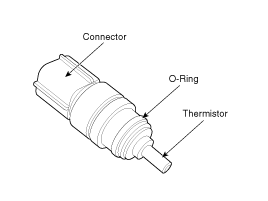Kia Cadenza: Engine Control System / Engine Coolant Temperature Sensor (ECTS) Description and Operation
Kia Cadenza YG 2016-2025 Service Manual / Engine Control / Fuel System / Engine Control System / Engine Coolant Temperature Sensor (ECTS) Description and Operation
| Description |
Engine Coolant Temperature Sensor (ECTS) is located in the
engine coolant passage of the cylinder head for detecting the engine
coolant temperature. The ECTS uses a thermistor whose resistance changes
with the temperature.
The electrical resistance of the ECTS decreases as the
temperature increases, and increases as the temperature decreases. The
reference +5V is supplied to the ECTS via a resistor in the ECM. That
is, the resistor in the ECM and the thermistor in the ECTS are connected
in series. When the resistance value of the thermistor in the ECTS
changes according to the engine coolant temperature, the output voltage
also changes.ion duration and controls the ignition timing using the
information of engine coolant temperature to avoid engine stalling and
improve drivability.
During cold engine operation, the ECM increases the fuel
injection duration and controls the ignition timing using the
information of engine coolant temperature to avoid engine stalling and
improve drivability.

 Manifold Absolute Pressure Sensor (MAPS) Repair procedures
Manifold Absolute Pressure Sensor (MAPS) Repair procedures
Inspection
1.
Connect the GDS on the Data Link Connector (DLC).
2.
Measure the output voltage of the MAPS at idle and IG ON.
ConditionOutput Voltage (V)IG ONApprox. 4.44VIdleApprox. 0.75V
...
 Engine Coolant Temperature Sensor (ECTS) Specifications
Engine Coolant Temperature Sensor (ECTS) Specifications
Specification
TemperatureResistance (kΩ)°C°F-40-4048.14-20-414.13 ~ 16.830325.7920682.31 ~ 2.59401041.15601400.59801760.32
...
Other information:
Kia Cadenza YG 2016-2025 Service Manual: General Information
General Troubleshooting Information Before Troubleshooting 1. Check applicable fuses in the appropriate fuse/relay box. 2. Check the battery for damage, state of charge, and clean and tight connections. (Refer to Engine Electrical System - "Battery") • ...
Kia Cadenza YG 2016-2025 Owners Manual: Check tire pressure
You can check the tire pressure in the information mode on the cluster. Tire pressure is displayed 1~2 minutes later after driving. If tire pressure is not displayed when the vehicle is stopped, “Drive to display” message displays. After driving, check the tire pressure. ...
Copyright © www.kcadenzavg.com 2017-2025

